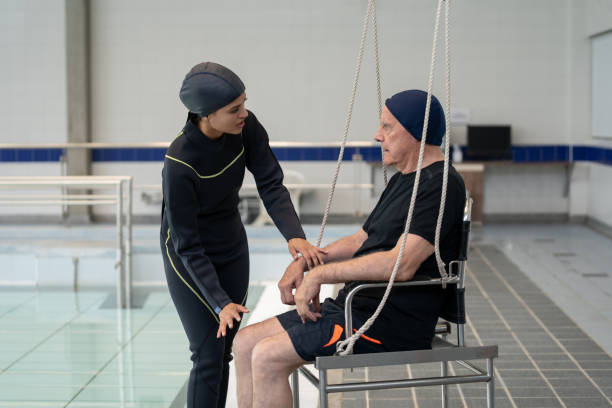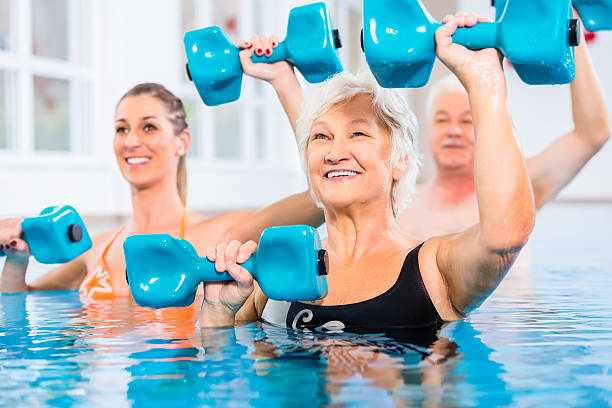Aquatic therapy, also known as hydrotherapy, has emerged as a highly beneficial form of physical rehabilitation and fitness for the elderly population. This therapeutic approach utilizes the unique properties of water, such as buoyancy, resistance, and hydrostatic pressure, to create a gentle yet effective environment for exercise. It addresses a wide range of health issues commonly experienced by older adults, including arthritis, stroke recovery, and balance disorders.
The supportive nature of water reduces the risk of injury and pain, making aquatic therapy a preferred and enjoyable method to enhance the physical health and overall well-being of senior citizens.
Contents
Key Benefits of Aquatic Therapy for Seniors
Aquatic therapy stands out as a revolutionary approach to improving mobility and flexibility among the elderly. Water’s buoyancy significantly decreases gravity’s effects, allowing seniors to move more freely and with less strain. This aspect is particularly advantageous for those struggling with joint pain or stiffness, as it enables them to perform stretches and exercises that might be too difficult on land.
Improved Joint Health and Mobility
Aquatic therapy offers significant relief for individuals who have arthritis and joint pain. Water’s buoyancy alleviates joint stress, allowing for pain-free movement and exercise. This improvement in mobility contributes to better joint health and flexibility, essential aspects of maintaining independence in old age.
Enhanced Muscular Strength
The resistance water provides during aquatic therapy exercises helps strengthen muscles without needing heavy weights, reducing the risk of injury. Seniors participating in regular aquatic therapy sessions can expect to see an improvement in muscular strength and endurance, which is crucial for daily activities and preventing falls.
Accelerated Rehabilitation and Recovery
For the elderly recovering from surgeries or strokes, aquatic therapy accelerates the rehabilitation process. The water’s hydrostatic pressure promotes increased circulation and reduces swelling, thereby speeding up recovery times and improving outcomes for stroke survivors and postoperative patients.
Balance and Coordination
Water provides a safe environment for practicing balance and coordination exercises without the fear of falling. Regular aquatic therapy can help improve an elderly person’s balance and coordination, significantly lowering the risk of falls, a leading cause of injury among older adults.
Stress Reduction and Mental Health
Beyond the physical benefits, aquatic therapy offers a serene and therapeutic setting that can help reduce stress levels and promote mental well-being. The soothing properties of water can have a calming effect on the mind, helping to alleviate symptoms of anxiety and depression often encountered by the elderly.
Implementing Aquatic Therapy in Senior Care Programs

To ensure that our elderly loved ones live their golden years with the highest possible quality of life, incorporating innovative and gentle exercise methods like aquatic therapy into their care routine is vital. Aquatic therapy offers a fusion of physical benefits and emotional wellness, tailored specifically to meet the needs and limitations of the aging population.
By exploring the advantages and implementing this form of therapy in senior care programs, we open doors to improved health, enhanced mobility, and a more joyful and fulfilling life for seniors.
Assessing Individual Needs
Before integrating aquatic therapy into a senior’s care routine, assessing their specific health conditions, capabilities, and rehabilitation goals is crucial. A personalized approach ensures that the aquatic exercises are both safe and effective, catering to the individual’s unique needs and preferences.
Creating a Supportive Community
Aquatic therapy sessions often foster a sense of community among participants. Establishing programs that encourage group activities can significantly enhance motivation and enjoyment for the elderly. This social interaction is not only beneficial for mental health but also provides additional support and encouragement during the rehabilitation process.
Monitoring Progress and Adjusting Regimens
Continuous monitoring of progress is essential in any therapeutic program. For seniors engaged in aquatic therapy, adjusting the difficulty and variety of exercises according to their improving fitness levels or changing health conditions ensures optimal benefits. Regular assessments by healthcare professionals help refine therapy plans to meet evolving needs effectively.
Training and Facilities
Ensuring accessibility to proper facilities and skilled therapists is fundamental in offering effective aquatic therapy. Senior care programs should invest in training staff to specialize in hydrotherapy techniques and maintain safe and welcoming facilities for the elderly, including accessible pools with appropriate temperature control and safety features.
Conclusion
Aquatic therapy offers a multitude of benefits for seniors, enhancing their physical health, promoting mental well-being, and fostering a sense of community. With careful assessment and personalized regimens, this gentle form of exercise can significantly improve the lives of the elderly, helping them maintain independence and enjoy their golden years to the fullest.
If you are in need of physical, occupational, or speech therapy services, please contact us at (920) 252-4442. We look forward to hearing from you.
